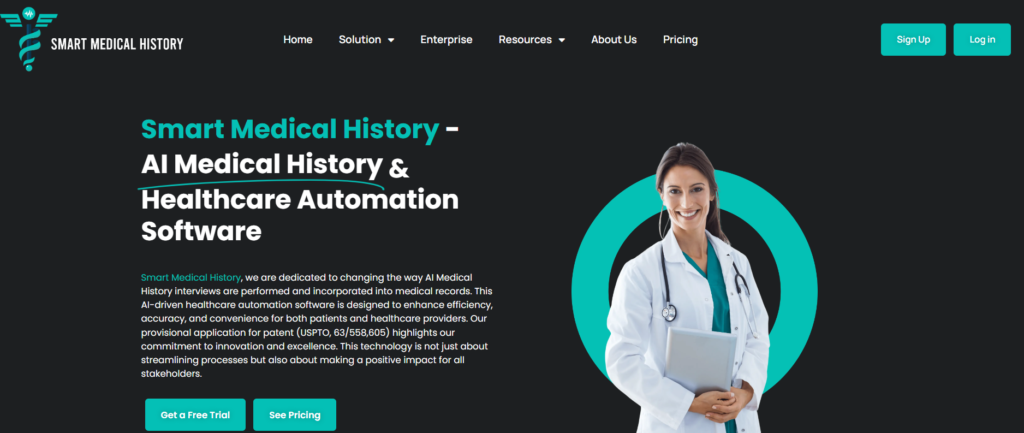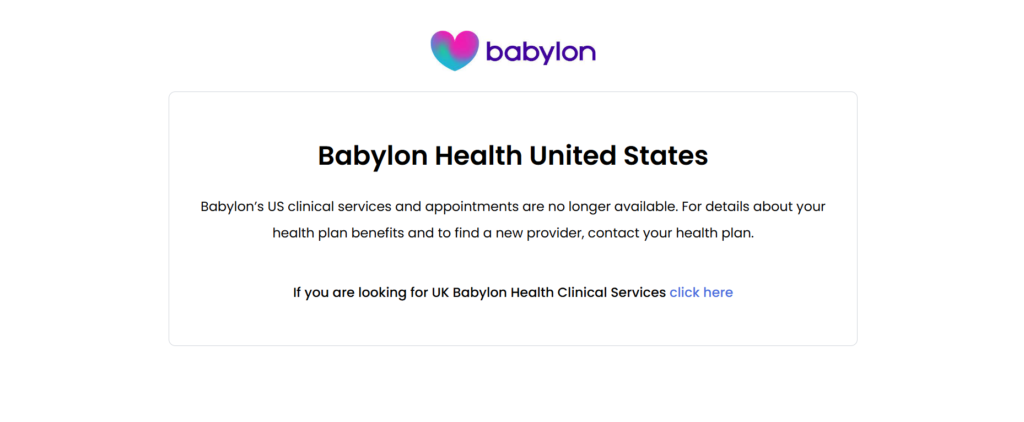Top 10 AI-Powered Virtual Assistants Transforming Patient Interaction
In today’s healthcare environment, AI virtual assistants for patient interaction are reshaping how healthcare providers communicate with patients, enhancing engagement and streamlining communication. These tools enable personalized care, ensuring that patients receive timely, accessible support and information. The rise of AI healthcare communication tools has made it possible for healthcare providers to handle administrative tasks efficiently, maintain accurate patient data, and ultimately deliver better care. Key players in this transformation, including tools like Medical AI Chatbot systems, also support comprehensive clinical data management by automating data entry and ensuring data accuracy.
Here are the top ten AI-powered virtual assistants that are enhancing patient engagement and helping healthcare providers manage patient interactions and data effectively.
1. SmartMedHx

SmartMedHx is an AI-driven virtual assistant tailored to improve patient interaction and engagement. With capabilities ranging from patient onboarding to symptom assessment, SmartMedHx streamlines interactions and supports healthcare providers by automating repetitive tasks.
- SmartMedHx offers AI in patient engagement by providing patients with real-time information, helping them navigate their healthcare journey.
- Integrated with clinical data management, SmartMedHx ensures that all patient data is recorded, stored, and accessible, allowing healthcare providers to make informed decisions based on comprehensive data.
2. Sensely
Sensely utilizes an AI-powered avatar to guide patients through various health-related questions and procedures. By providing real-time responses, Sensely improves patient engagement and enhances the accuracy of data collection.
- Sensely enhances AI healthcare communication tools by allowing patients to engage directly, receiving answers and guidance on routine health matters.
- The platform integrates with clinical data management systems to capture and organize patient interactions, supporting accurate and efficient healthcare operations.
3. Florence
Known as the “healthcare companion,” Florence is a virtual assistant that aids patients in managing their medication, monitoring symptoms, and providing general health advice. Florence’s interactive interface improves treatment adherence and patient knowledge.
- Florence’s AI virtual assistants for patient interaction capabilities help patients stay compliant with prescribed treatment plans and monitor their symptoms.
- With seamless integration into Medical AI Chatbot systems, Florence assists healthcare providers in tracking patient progress and storing valuable data for ongoing care.
4. Woebot
Woebot specializes in mental health support, offering patients conversational AI-based cognitive behavioral therapy (CBT). Through guided conversations, Woebot helps patients manage their mental health with practical exercises and check-ins.
- Woebot’s AI-powered patient communication approach provides accessible mental health support for patients, encouraging regular check-ins and self-care.
- By recording interactions, Woebot contributes to clinical data management by offering mental health providers insights into patient progress and engagement.
5. Babylon Health

Babylon Health provides an AI assistant that helps patients assess symptoms and connect with healthcare professionals. Babylon’s AI algorithms offer initial health assessments and recommend follow-up actions based on patient input.
- Babylon’s AI healthcare communication tools empower patients to gain insights into their health and make informed decisions.
- Integrated with clinical data management systems, Babylon ensures that patient data is accurately recorded, providing healthcare providers with the information needed for effective care.
6. Ada Health
Ada Health offers a conversational AI that assists patients in symptom checking and recommends appropriate care. Ada’s personalized approach tailors its responses based on patient information, guiding users toward informed healthcare choices.
- Ada Health exemplifies AI in patient engagement by customizing patient interactions and providing relevant health guidance.
- With support for clinical data management, Ada tracks patient interactions, ensuring healthcare providers have access to valuable data for follow-ups.
7. HealthTap
HealthTap features an AI-powered virtual assistant that answers health-related questions directly from verified doctors, providing quick, reliable information. This AI assistant helps patients make informed health decisions from the convenience of their devices.
- HealthTap’s AI virtual assistants for patient interaction enable immediate access to medical advice, improving patient understanding and engagement.
- The assistant works in conjunction with Medical AI Chatbot systems, managing patient data for easy access and efficient communication.
8. Buoy Health
Buoy Health uses machine learning to provide patients with accurate symptom assessments and health guidance. By gathering and analyzing data, Buoy delivers personalized health recommendations that guide patients through their healthcare needs.
- Buoy Health supports AI-powered patient communication by helping patients understand their symptoms and make informed healthcare choices.
- This assistant enhances clinical data management by recording and organizing patient data, making it easily accessible for healthcare teams.
9. GYANT
GYANT is an AI-powered assistant that guides patients from initial assessment to post-care follow-up, collecting essential data and providing personalized recommendations along the way.
- GYANT’s AI healthcare communication tools offer customized guidance based on each patient’s profile, supporting informed decision-making.
- Integrated with clinical data management solutions, GYANT organizes patient data seamlessly, providing healthcare providers with comprehensive insights.
10. Robin Healthcare
Robin Healthcare combines virtual assistance with AI transcription to document patient interactions during consultations. Unlike traditional what is a medical scribe roles, Robin records and transcribes conversations automatically, streamlining administrative workflows.
- Robin’s use of AI-driven transcription accuracy ensures all patient details are recorded accurately, enhancing documentation quality.
- Supporting clinical data management, Robin ensures that complete, up-to-date patient records are available, supporting efficient healthcare workflows.
How AI Virtual Assistants Transform Patient Engagement
Increasing Accessibility and Interaction
AI virtual assistants for patient interaction improve accessibility by providing patients with 24/7 access to health information and support. These assistants enable patients to seek information and engage with healthcare systems on their terms, enhancing overall patient satisfaction.
- Accessible communication allows patients to engage actively, improving their involvement in healthcare decisions.
- These systems provide continuous AI in patient engagement, enabling patients to stay connected to their care providers.
Streamlining Clinical Data Management
AI-powered virtual assistants simplify clinical data management by capturing and securely storing patient interactions. Each interaction is documented automatically, ensuring that healthcare providers can access accurate and comprehensive patient information.
- Automated data management eliminates gaps in documentation, ensuring data consistency across healthcare systems.
- With seamless data storage, virtual assistants support data-driven decisions that lead to improved patient care outcomes.
Reducing Administrative Workload
By handling routine tasks such as answering questions, gathering patient data, and managing appointments, virtual assistants significantly reduce the workload on healthcare providers. This allows them to focus on core clinical tasks rather than administrative duties.
- AI-powered assistants improve efficiency by handling administrative responsibilities, reducing staff workload.
- By managing repetitive tasks, these assistants enhance the effectiveness of AI healthcare communication tools in supporting healthcare providers.
Conclusion
The integration of AI virtual assistants for patient interaction is transforming healthcare by improving communication, enhancing data accuracy, and streamlining workflows. From Medical AI Chatbot systems to sophisticated clinical data management solutions, these tools enable healthcare providers to focus on patient care while maintaining accurate and accessible records. Each of these ten AI-powered virtual assistants brings unique capabilities to healthcare, facilitating smoother patient interactions and enhancing the quality of care.
With ongoing advancements in AI, virtual assistants will continue to play an integral role in patient engagement, supporting healthcare providers and enhancing the overall patient experience. By leveraging these tools, healthcare providers can offer more efficient, personalized, and accessible care, ensuring that patients remain engaged and informed throughout their healthcare journey.
FAQs Related to AI Virtual Assistants in Healthcare
What are the top AI-powered virtual assistants for patient interaction?
The top AI-powered virtual assistants for patient interaction include SmartMedHx, Sensely, Florence, Woebot, and Babylon Health, each enhancing patient engagement and streamlining healthcare workflows.
How do AI tools transform patient engagement in healthcare systems?
AI tools improve patient engagement by offering accessible information, continuous support, and real-time interaction, streamlining communication between patients and providers and ensuring accurate documentation.
How does clinical data management benefit from AI-powered patient communication tools?
Clinical data management benefits from AI-powered tools by ensuring accurate documentation, secure data storage, and easy data retrieval, enabling healthcare providers to make informed, data-driven decisions.




